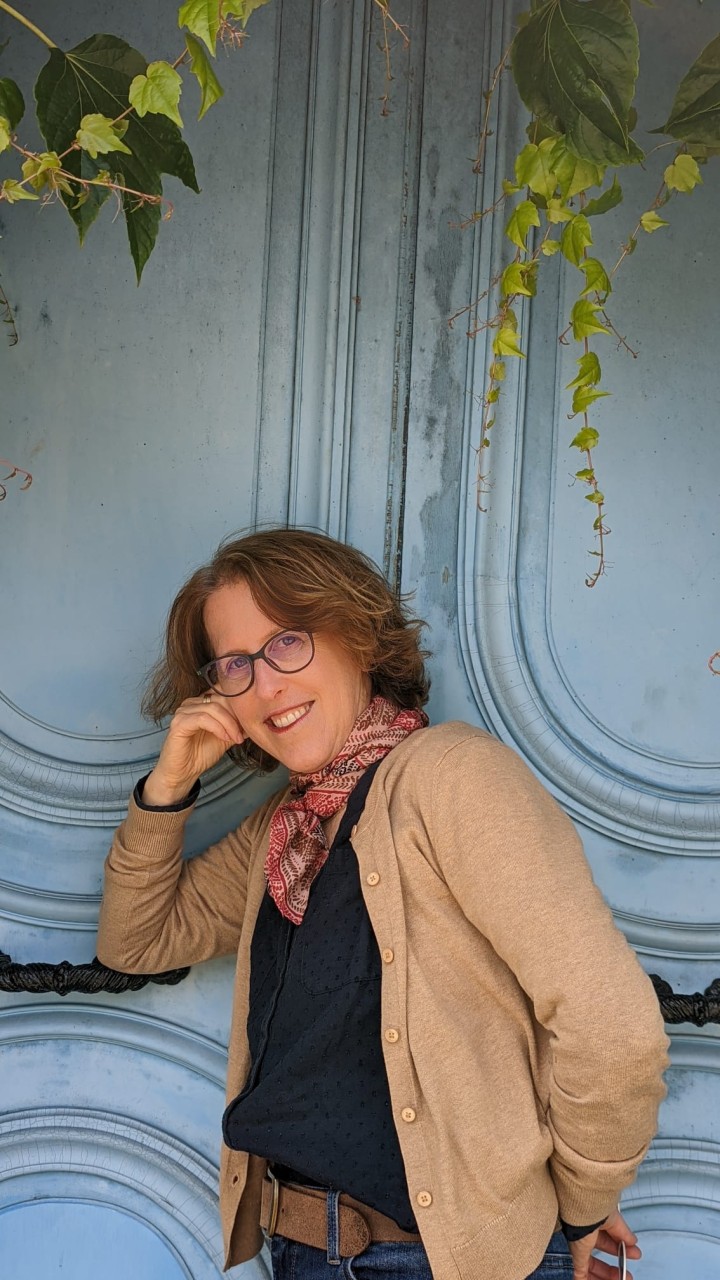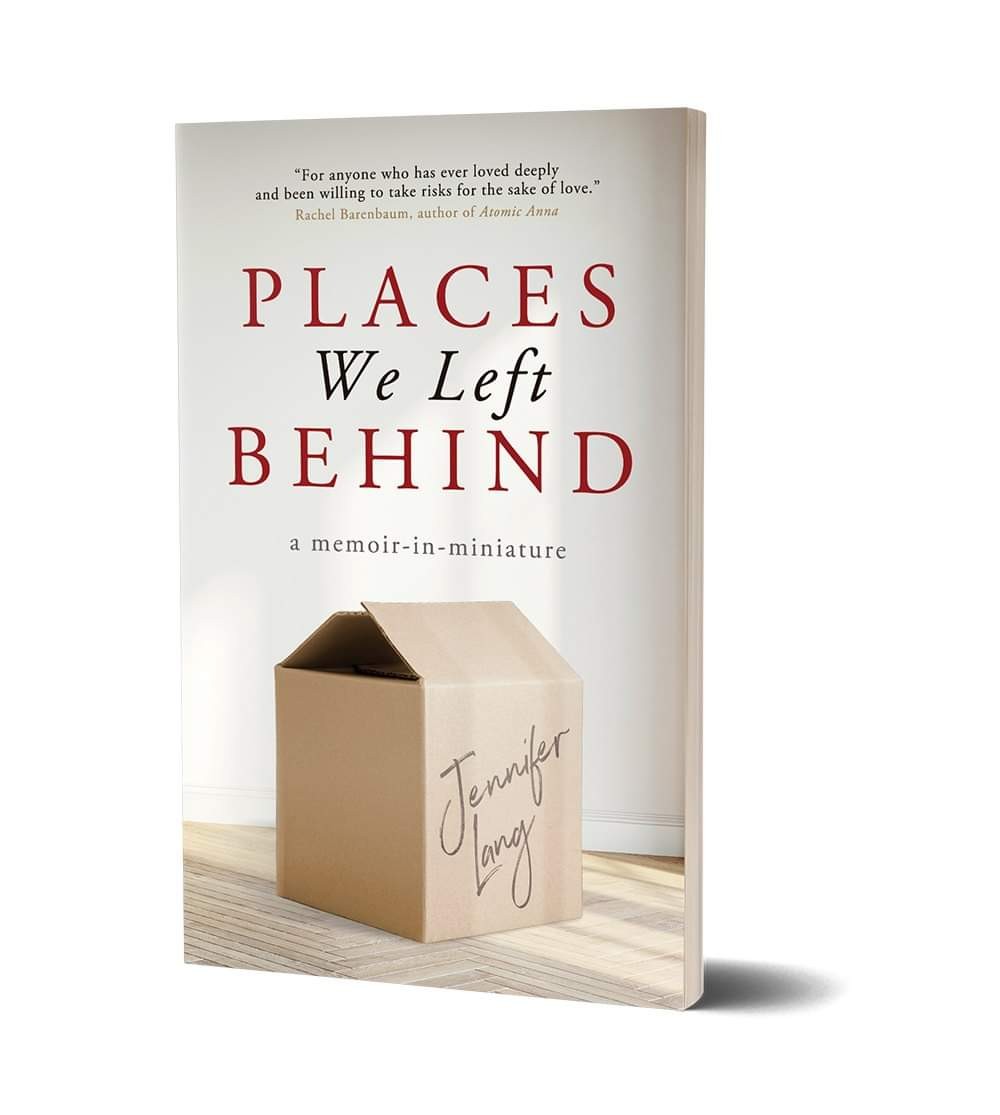Author Interview: Jennifer Lang
I wholly disagree that memoir is trashy, primitive or low-rent. It's tough. It's human. It's revelatory. When done well, it's the full-body shivers or deep-buried sigh or unbidden tears.
I love interviewing authors and I particularly like hearing from my colleagues here in Israel writing in English as we share so many commonalities. I'm happy today to have memoirist Jennifer Lang visit me here on gilagreenwrites for the second time. She shares a lot about memoir writing both in the general and in the particular. In our interview we talk about oversharing, playfulness in form, and the battle between fiction and nonfiction, as well as the religious and the secular. For good measure, we throw in the threads between yoga practice and religious practice.
GG: How do you write about people you love without betraying them? Is your playfulness with form one of the ways to do so?
JL: Like a fiction writer, I consider everyone characters, myself included. Yes, I am writing about myself, my husband, our family, my parents, but they are her, him, they, them. That perspective gives me the emotional distance necessary to open up and write about those intimate details.
That said, your question about playfulness with form is really interesting. Back in 2016, after a developmental editor read my original straightforward prosaic manuscript and sent me detailed feedback, one of her comments was that I needed to better flesh out my secondary characters a.k.a. everyone not me. I felt unable to cross that line when it came to my kids as sensitive teens and burgeoning adults. I'd been writing about them long before they were, throughout my pregnancies, when they were little, but it started to feel different as they grew up. Perhaps playing with form was my subconscious solution to the issue, a way around making them multi-dimensional and complex without taking it all too seriously or compromising them and their burgeoning young-adult identities.
GG: Well known memoirist, Mary Karr describes memoir as trashy and primitive. It's outside art. No one will ever give you an academy award for it. (My paraphrase. ) How do you respond to this ? Do you feel memoir is low- rent compared to fiction ?
JL: I love Mary Karr. Met her twice: first from afar at Creative Nonfiction Conference at Goucher College, circa 2006, and then up super close and very personal, on a yoga mat during my private class with a student (her then boyfriend's best friend) in White Plains, NY the summer of 2011 (my student's farewell gift to me before moving to Israel). I love her brutal honesty, her wicked sense of humor, her keen understanding of how not simple it is to be alive.
But… I wholly disagree that memoir is trashy, primitive or low-rent. It's tough. It's human. It's revelatory. When done well, it's the full-body shivers or deep-buried sigh or unbidden tears.
GG: Often people read memoir because they crave the real. Do you think writing in such a brief way interferes with satisfying that craving?
JL: Obsessed with compressed prose, often called flash—and in my case flash nonfiction—I think the real isn't about length or quantity of words as much as content and quality of the writing. Sometimes it's also about the form. In other words, I don't think brief interferes with the real. They are not mutually exclusive, either/or. I've read some very moving, mind-blowing short pieces and am almost more wowed because of their brevity. For example, Casey Mulligan Walsh's "Still" Split Lip or "Having Given Up" by Jeff Oaks.
GG: I often work with Jewish writers who fear portraying Israel and Jews in a negative light. They worry they are contributing to the antisemitism out there. Did you have any such worries in this work?
JL: My mission is many-fold: to share the complexity of this country, to show the diversity of the population, to reveal the country's underbelly (as well as my own), to reveal my range of emotions from raw fear to chest-pounding pride about living here not to a Jewish or Israeli audience but to the greater world audience. I am honest—neither anti-Semitic nor anti-Zionist—and don't think my honesty about my ambivalence comes across as anti-anything in any way. Rather that ambivalence—my simultaneous desire to say or do two opposite or conflicting things—towards this place creates the tension necessary for good story. It fuels my writing. My adopted country and inherited religion serve as my muse.
GG: In your work , the heroine struggles with compromise on a large scale. Do you think there are marriages with less compromise or is the compromise only more obvious when it's so external as religion and geography are?
JL: I've thought about this for a long, long time, especially when looking at certain friends whose marriages seem more stable, less volatile, un-angsty. I've wondered if our issues are bigger, harder, more seemingly impossible to resolve than other people. But I'm not sure I'll ever know the answer or if comparing one couple's hot-button issues and compromises to another's is even fair.
GG: Why did you choose to end the memoir before your son's army service?
JL: Great question. Short, easy answer: Landed: A yogi's memoir in pieces & poses. It took years of writing and revising to understand I had not one but two memoirs, each asking different questions. My son's army service ended up in the second memoir, which will be published by Vine Leaves Press in October 2024.
GG: At one point in the book, you question if yoga rooted you the way religion rooted your husband. Do you still suspect this?
JL: I do. Though I wasn't the one who realized it. I owe that realization to a developmental editor who read my second manuscript (Landed) in 2020 and questioned it during a scene describing my Ultra-Orthodox nieces and nephews swaying in prayer, writing "I find it potentially interesting to explore how SHE does this in her own way with yoga…and maybe how they aren't so different?"
SHE as me, the narrator.
Alone at my desk, my fingers hovering over the edge of the keyboard, I exhaled: audibly, loudly, deeply. As if I sensed this truth—yoga was to me as Judaism was to my husband—but had not yet acknowledged it. Never verbalized it. That understanding then made me see my first manuscript differently and pushed me to return to the text and plant it.
One of my most beloved writing instructors, Rebecca McClanahan, taught us the idea of plant [a thought, object, revelation, fact] and return later so the reader makes the connection and senses its power.
GG: There is a strong image of a mother in opposition on Shabbat to her husband and four kids and yet an opposite image of a mother allowing her kids to ride in a car and swim on Shabbat without her husband's knowledge. So do the mother and father take turns as the odd one out so to speak? Are these temporary dynamics? How is the reader to resolve them ?
JL: Not at all. There was no taking turns while raising the kids. We raised them in a Modern Orthodox community first in Oakland, CA then in White Plains, NY with one year in Ra'anana, Israel. In each place, they went to Modern Orthodox schools and we belonged to Modern Orthodox shuls. We cooked Shabbat meals ahead of time and didn't use the car or spend money or – or - or - or.
Raised Reform in Northern California, I grew up with a curtailed, adaptable, assimilated version of Judaism. In my world, Shabbat was an occasional Friday night dinner with my grandparents, blessings over the wine and bread if my father or Zaida remembered. At Camp Swig, Shabbat was a break from the rest of the week and a total celebration: everyone in white, services on the lawn before dinner, arms around each other, song leader playing his guitar, moving side to side in unison, singing, chanting, praying as one. On Saturday, we folk danced, swam in the pool, played Gaga, took walks, wrote letters to our parents and friends, got special treats at the canteen. Youth group Shabbatons were similar in that they were about friendship/relationship (you can read between the lines) and prayer, not restrictions or laws. When I think back to my junior year of high school, when I was Chaplain of CAFTY(California Federation of Temple Youth) in charge of planning and leading the Shabbat services, I laugh. How far I've come. How much I've left behind.
By the time I graduated college, my brother was on his way to becoming Ultra-Orthodox. We had no choice but to imbibe his long list of do's and don'ts. He hadn't taken a leap but a plunge into faith seemingly overnight, refusing to eat off our parents' non-kosher plates, to allow our aunt to mourn her father with the other men during the Kaddish, and so many other holier-than-thou prohibitions. But just because he found hashem didn't mean I had. And if you don't have that baseline belief [in god] then all of those rules and restrictions seem absurd. As a mother, I tried my hardest to toe the line of the house, to give our kids a united Jewish front, but as a wife, I ranted and resented it all. As a wife, I understood our agreement: I got country, he got religion.
GG: Does the term oversharing or confessing frighten you sometimes into silence when you write?
JL: Yes—and no. I have my limits. There are certain topics that are off-limits. But I don't think good memoir is oversharing as much as bearing witness to our own, shared humanity. And that is beautiful.
California-born Jennifer Lang lives in Tel Aviv, where she runs Israel Writers Studio. Her essays have appeared in the Baltimore Review, Crab Orchard Review, Under the Sun, Consequence, and elsewhere. Places We Left Behind: a memoir-in-miniature (9/23) and Landed: A yogi's memoir in pieces & poses (10/24) will both be published by Vine Leaves Press.
When you subscribe to the blog, we will send you an e-mail when there are new updates on the site so you wouldn't miss them.



Comments